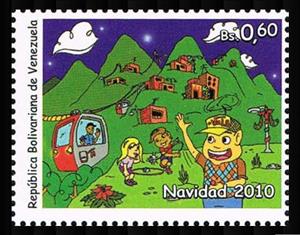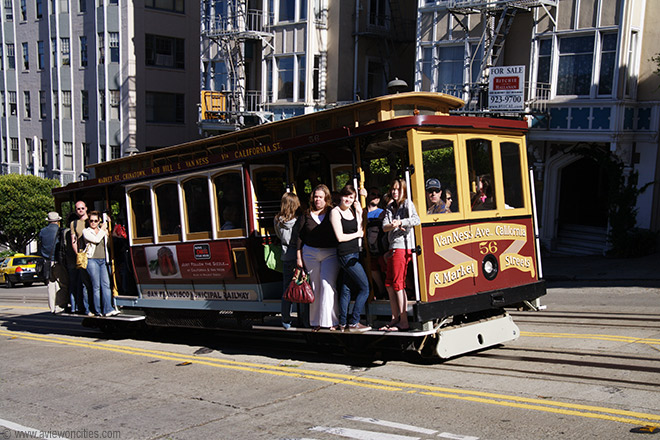Stamp: Cable car (Venezuela 2010)
Cable car (Venezuela 2010)
07 December (Venezuela ) within release Christmas 2010 goes into circulation Stamp Cable car face value 0.60 Venezuelan bolívar
| Stamp Cable car in catalogues | |
|---|---|
| Michel: | Mi: VE 4252 |
| Stamp Number: | Sn: VE 1712d |
Stamp is horizontal format.
Printed by Versilia Impresores C.A. Designed by Alejandro Lupi.Also in the issue Christmas 2010:
- Stamp - Father and son opening Christmas gift face value 6.50;
- Stamp - Child on blanket in plaza, people and bus face value 10;
- Stamp - Satellite over the Three Magi face value 0.30;
- Stamp - Woman and men at market face value 0.60;
- Stamp - Father and son outside of candy store face value 10;
- Stamp - Musicians face value 0.30;
- Stamp - Fireworks face value 4.50;
- Mini Sheet - Christmas 2010 face value 37.60;
- Stamp - Teacher and children face value 4.50;
- Stamp - Nativity face value 0.30;
- Stamp - Cable car face value 0.60;
Stamp Cable car it reflects the thematic directions:
A cable car (usually known as a cable tram outside North America) is a type of cable railway used for mass transit in which rail cars are hauled by a continuously moving cable running at a constant speed. Individual cars stop and start by releasing and gripping this cable as required. Cable cars are distinct from funiculars, where the cars are permanently attached to the cable.
Christmas or Christmas Day (Old English: Crīstesmæsse, meaning "Christ's Mass") is an annual festival commemorating the birth of Jesus Christ, observed most commonly on December 25 as a religious and cultural celebration among billions of people around the world. A feast central to the Christian liturgical year, it is prepared for by the season of Advent or the Nativity Fast and initiates the season of Christmastide, which historically in the West lasts twelve days and culminates on Twelfth Night; in some traditions, Christmastide includes an Octave. The traditional Christmas narrative, the Nativity of Jesus, delineated in the New Testament says that Jesus was born in Bethlehem, in accordance with messianic prophecies; when Joseph and Mary arrived in the city, the inn had no room and so they were offered a stable where the Christ Child was soon born, with angels proclaiming this news to shepherds who then disseminated the message furthermore. Christmas Day is a public holiday in many of the world's nations, is celebrated religiously by the vast majority of Christians, as well as culturally by a number of non-Christian people, and is an integral part of the holiday season, while some Christian groups reject the celebration. In several countries, celebrating Christmas Eve on December 24 has the main focus rather than December 25, with gift-giving and sharing a traditional meal with the family.
Tourism is travel for pleasure or business; also the theory and practice of touring, the business of attracting, accommodating, and entertaining tourists, and the business of operating tours. Tourism may be international, or within the traveller's country. The World Tourism Organization defines tourism more generally, in terms which go "beyond the common perception of tourism as being limited to holiday activity only", as people "traveling to and staying in places outside their usual environment for not more than one consecutive year for leisure, business and other purposes". Tourism can be domestic or international, and international tourism has both incoming and outgoing implications on a country's balance of payments. Today, tourism is a major source of income for many countries, and affects the economy of both the source and host countries, in some cases being of vital importance.



